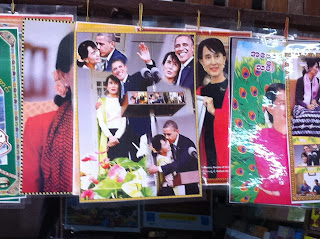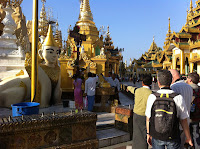In 1922 Somerset Maugham set out by boat from Colombo to Yangon, then called Rangoon Rangoon to Mandalay , where he embarked by mule to Keng Tung in the Shan States of northeastern Burma , present-day Myanmar Burma and Siam , present-day Thailand
Ninety-one years later, on the way back to Singapore, I find myself leafing through the 2001 Vintage Classic pocket with the same name in a tourist bookstall at Yangon International Airport. A must-have, I conclude. The incurable romantic in me is intrigued. What Burma Burma
This is the 21st century. Maugham will not have worried in the least about his ecological footprint, whereas I, with a slightly bad conscience, look over my shoulder at the seven-league boot imprints that are leaking kerosene from Amsterdam right up to Yangon, an accusatory skid mark 9000 kilometres long as the crow flies.
This is the 21st century. Maugham will not have worried in the least about his ecological footprint, whereas I, with a slightly bad conscience, look over my shoulder at the seven-league boot imprints that are leaking kerosene from Amsterdam right up to Yangon, an accusatory skid mark 9000 kilometres long as the crow flies.
We are living fast pace in fast space. Always everywhere connected, even in remote, secluded Burma
Maugham only had his notebook, and had to use words to describe in seven years what the smartphone shows us in seven seconds.
The glorious, bygone days of words’ supremacy, of words’ transcendency. Words that visualise what the inner eye sees, far subtler, far more fragile, far more layered. L’essentiel est invisible pour les yeux. Antoine de Saint-Exupéry. Words that unveil hidden realities, words that mask existing ones, words that create, words that annihilate, words that nudge and coax, and flatter and go a long, long way.
I would like to share these words here, mine and Maugham´s, as full-fledged images, juxtaposed with series of pictures for contrasting or complementary effect. Perhaps that way l’essentiel devient visible. On ne voit bien qu’avec le coeur.
Part I - Yangon
 |
| Bookstall, Scott Market, Yangon, January 2013 |
The line it is drawn
The curse it is cast
The slow one now
Will later be fast
As the present now
Will later be past
The order is
Rapidly fadin'
And the first one now
Will later be last
For the times they are a-changin'
The curse it is cast
The slow one now
Will later be fast
As the present now
Will later be past
The order is
Rapidly fadin'
And the first one now
Will later be last
For the times they are a-changin'
 |
| Irrawaddy, River bank, Downtown Yangon |
“It was a gay and sunny morning when the ship that I had taken at Colombo steamed up the Irrawaddy . They pointed out to me the tall chimneys of the Burmah Oil Company and the air was grey and misty with their smoke. But behind the smoke rose the golden spire of Shwe Dagon. And now I found that my recollections were entirely pleasing, but nebulous; a cordial welcome, a drive in an American car through busy streets of business houses, concrete and iron like the streets, good heavens! of Honolulu, Shangai, Singapore or Alexandria, and then a spacious, shady house in a garden; an agreeable life, luncheon at this club or that, drives along trim, wide roads, bridge after dark at that club or this, gin pahits, a great many men in white drill or pongee silk, laughter, pleasant conversation; and then back through the night to dress for dinner and out again to dine with this hospitable host or the other, cocktails, a substantial meal, dancing to a gramophone, or a game of billiards and then back once more to the large cool silent house. It was very attractive, easy, comfortable and gay; but was this Rangoon Rangoon
Oh nothing has changed in ninety-one years. These recollections, they could have been mine. They are, as a matter of fact. Maugham visits Shwe Dagon at night:
“It is the most venerable place of worship in the country. It enshrines eight hairs from the head of the Buddha. My Burmese friends offered now to take me and I put my Western pride in my pocket. It was midnight. Arriving at the temple we went up a long stairway on each side of which where booths; but the people who lived in them, to sell the devout what they might require, finished their work and some were sitting about, half naked, chatting in undertones, smoking or eating a final meal, while many in all attitudes of abandonment were asleep, some on low native beds and some on the bare stones. Here and there, left over from the day before, were masses of dying flowers, lotus and jasmine and marigold; they scented the air heavily with a perfume in which was already an acrid decay. At last we reached the great terrace. All about shrines and pagodas were jumbled pell-mell with the confusion with which trees grow in the jungle. They had been built without design or symmetry, but in the darkness, their gold and marble faintly gleaming, they had a fantastic richness. And then, emerging from among them like a great ship surrounded by lighters, rose dim, severe and splendid, the Shwe Dagon. Lamps illuminated with a sober glow the gilt with which it was covered, It towered, aloof, impressive and mysterious against the night. A guardian walked noiselessly on his naked feet, and old man was lighting a row of candles before an image of the Buddha; they gave an emphasis to the solitude. Here and there a yellow-robed monk muttered a husky invocation; his droning punctuated the silence.”
It is remarkable how much these words still fit the experience. Perhaps there is a little less solitude and a little less silence these days at nightfall, and a great many more Western tourists, but in essence it is all there, and it is exactly as Maugham describes. I find that very touching. What he describes – the solitude and the silence – est l’essentiel invisible pour les yeux. On ne voit bien qu’avec le coeur.
 |
| Kandawgyi Lake, Yangon - in the distance the golden dome of Shwe Dagon Pagoda |
 |
| Shwe Dagon, Great Terrace, Yangon |
 |
| Shwe Dagon, Great Terrace, Yangon |
 |
| Shwe Dagon, Great Terrace, Yangon |
 |
| Shwe Dagon, Great Terrace, Yangon |
 |
| Shwe Dagon, Great Terrace, Yangon |
 |
| Shwe Dagon, Great Terrace, Yangon |

1 comment:
This is fantastic. Thanks for your insights, the Maugham comparisons/quotes and the photos. Best, Andrew Selsky
Post a Comment